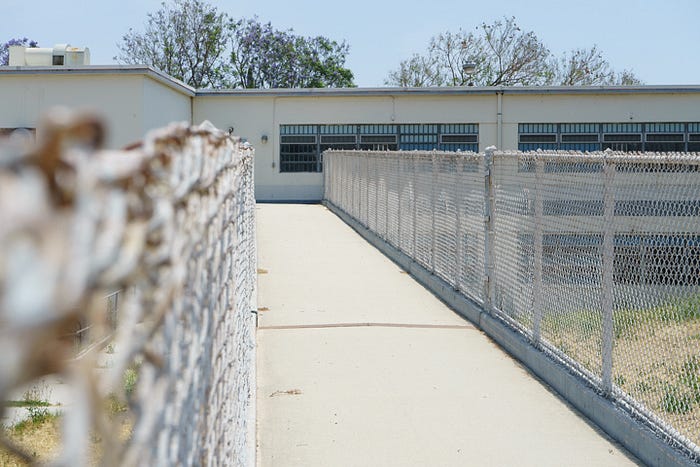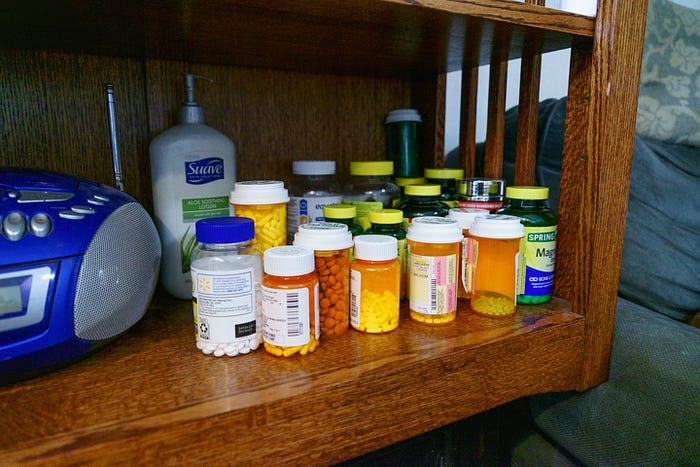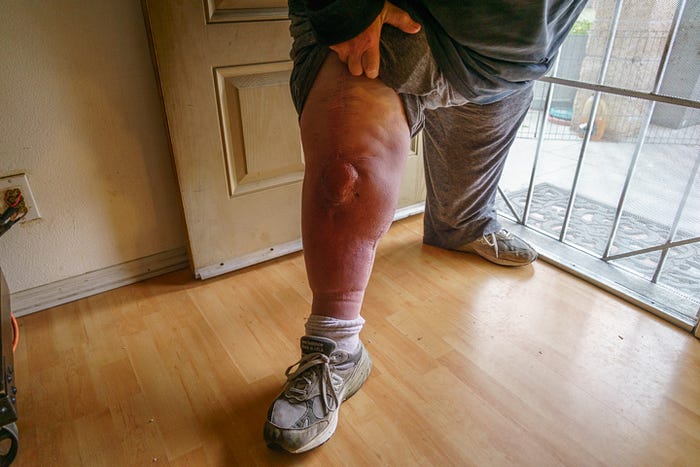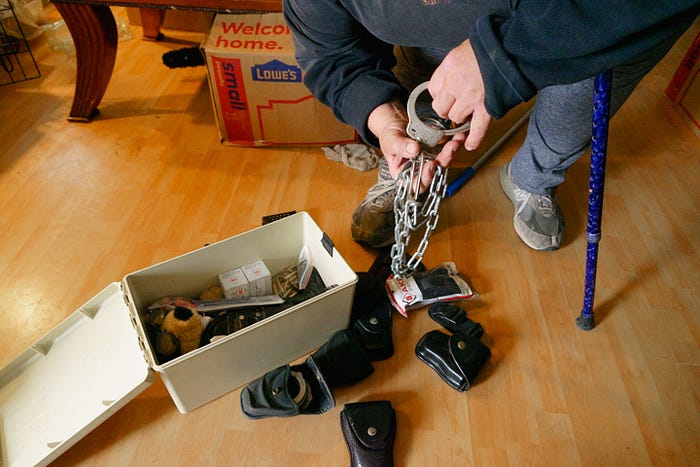
Gladiator School: Stories from Inside YTS (Ep 14)
“Battle scars”
Edited and photographed by David William Reeve
Editor’s note: This is Part 14 of “Gladiator School: Stories from Inside YTS” — an oral history of life inside California’s most notorious juvenile prison. Youth Training School (known formally as Heman G. Stark Youth Correctional Facility) had a reputation for mayhem, violence and murder that earned it the name Gladiator School. It closed in 2010. Juveniles were hardened for survival at YTS, only to be returned to the streets.
Since publishing the story The Closing of California’s Most Violent Juvenile Prison, survivors of YTS have come forward to tell stories of daily life inside. This series relays and respects their stories: Juvie told by those who were there.
In this episode, the 15-year-old son of a prominent correctional officer arrives at YTS as a high school intern, soon to follow in his father’s footsteps. He comes of age in the institution as a young night watchman. Immersed in the prison’s hidden underbelly, he comes to know the institution like no other — a harrowing portrait of the prison after dark.
“Battle scars”
There are three housing units built in different eras. The last two were built within three or four years of each other, but the first one was built ten years before the other two. It was built like Alcatraz — concrete walls a foot-and-a-half thick. It had these secret nooks and crannies underneath, like a basement and a bomb shelter. Pipes would leak and rust, so there was a lot of moisture and mildew. There were no fences in the beginning. In the northeast corner was a broken-down car where officers would sit and watch the yard. Years later, they put up a fence, cameras, and all the other stuff.
I worked a lot of nights and didn’t sleep much. I wasn’t the type to catch a little nap time in the car when nothing was going on. Even before I was a sergeant, I had a set of keys to go anywhere and do anything. On a boring night, I’d tell somebody, “Hey, you want to go do some investigating?”
“Have you ever been underneath the auditorium?” a lieutenant at the time asked me. There’s a staircase that goes up, but if you go around, there’s a door. You go in the door, and that door leads to another door. Then, a staircase goes down and leads you underneath the auditorium.

YTS was built in the middle of farmland. There’s cow poop everywhere, asbestos, and lead paint inside. It’s an old, rickety building in the middle of a dairy farm. Everything about the place was bad.
My dad gave me a couple of pieces of advice. The one I took to heart the most was, don’t ever let the job be too serious — just don’t let it eat you up because a lot of people can’t take the stress.
Some of the correctional officers would kill themselves. The average lifespan of a correctional officer after retirement is two years; then, they drop dead. At YTS, it was only 18 months.
There was a correctional officer, a sergeant, I think, that was stone-cold blind. He’d barely see shapes but no lights or anything. The phone rings at two o’clock in the morning, and he says to me:
“The doctors want to drill a hole in my head and relieve the pressure. They said that might let my eyesight come back a little bit.”
He ended up dying a couple of weeks later.
1984. I was going to a private high school where we were required to volunteer. I’d almost fulfilled my volunteer work by coaching a kid’s sports team, but then I needed more time. My dad said:
“You can volunteer at the institution.”
I’m like, “Okay, cool.”
“They won’t pay you but will give you gas money to get there.”
I went to Youth Training School after high school and stayed as late as nine o’clock. I would meet my father there. Since he’d been working at the institution a long time and had seniority, he would have friends running areas of the institution. He’d take me to one of those guys, and then they’d watch over me. They’d show me what to do and how to do it, what YTS was all about, and who the inmates were. I would work with them for 3 or 4 hours; then, they would escort me out of the institution, and I’d get a ride home.
Scary stuff for a 15-year-old. At that point, it was Gladiator School.
The age group housed there was 18–25, the average being 24 years old, and many were over 6 feet tall. Eighty-percent were there for murder. I was 15 years old, among these monsters. As an average kid, seeing a guy that works out 20 hours a day is scary. The guys were absolutely round with muscles, so hulking big that they could no longer turn their necks. They couldn’t put on a shirt. They couldn’t scratch their back. They would do nothing but lift weights all day long, and weights were everywhere. They’d be lifting their mattress, trash bags filled with water, and stacks of books.
I’m like, “A thousand pushups? That’s incredible!” They would do it — nothing but time.

These guys would prepare for their fights every minute of the day. It was very organized, like gladiators. They would have a set time, fight, then handle their business.
What’s weird is they felt comfortable with me, and I wasn’t a threat to them — I was like their little brother.
Early in my father’s career, he was one of the bone breakers — the security guys. Like in a gang, I’d automatically go into the gang with street credit. I rolled in there at 15 years old with some of my father’s street credit and was already acknowledged as a staff member. I got a nickname right off the bat — Junior, because of my dad.
I would see guys, monsters — that would give me nightmares, who knew me as Junior. I was supposed to be a fly on the wall, but they would need two staff for 40 wards in the day room, so they’d use me as a staff. Technically, it’s illegal now, and they can’t do that, but it was a different time.
Most of the time, they would gather around me like a bunch of military guys seeing a woman on base, asking me questions like What kind of women have I seen? or What’s going on in the world? I thought of my family as very blue-collar, but to all of them, I was a rich, spoiled kid.
They’d be happy to show me their battle scars.
“See this?” They’d move their hair to one side and reveal a scar that runs halfway through their head. “I got hit in the head with a machete, and it split my skull open.”
When my mother had me, she was 16, and my father was 17. At 18, I thought I was already old. I graduated high school at 16. I should have buckled down and gone to college for four years, but I goofed off. I had a steady girlfriend, and I wanted everything right then. I was going to get started early, get married, have kids, and everything. Her friends told her, “Hey, that guy will never amount to anything. He doesn’t have a job. He’s not serious at school.” She dropped me. She was upset about it, too.
I was 20 and working as an auto mechanic, making no money. I liked the cars, but I wanted to work on my cars and my hot rods. I didn’t want to do all this nonsense for somebody else.
Screw it, I thought. I’m going back to Youth Training School and work where my dad works. Money is better. It’s more exciting than the day-in, day-out grind of auto mechanics.
Working at YTS wasn’t hard work. They said you do not get paid for what happens there. You get paid for what ‘could’ happen. Let the wards know it’s time for breakfast, watch them poop, watch them shower, turn on the TV, sit with them, chit chat, and then go home.
They pay you a ton of money for that? It’s like, “Yeah.”
And the next day, when somebody hits you in the back of the head with a brick, and they stomp on you, then ten guys beat each other to a pulp, blood everywhere, you got the same amount of money for that as you did for watching TV and chit-chatting. You get paid for what could happen.
I ended up getting hired at age 22.

It’s weird. The inmates want to kill each other but don’t want to see each other die. If an inmate hangs himself, right away they start screaming and yelling to try and stop it.
This guy decided to kill himself in the hospital area. He hung himself around four or five o’clock. They went to serve him dinner at six o’clock, and they found him dead. They put his body on a gurney, covered him with a sheet, and then left him in the hallway. My buddy worked in the hospital unit and usually got there early. The hospital was hardly ever busy, so he would always try to sneak away and visit us, play cards, or goof off.
One night he sees the gurney in the hallway.
“What’s this?” He grabbed the sheet and lifted it. He looked and goes, “Oh, wow! That guy’s dead!” He put his arm around him and lifted him up.
“I think this guy should be my new best buddy!”
He put his arm around the body. “What do you think? Should he be my best buddy?” The nurse is like, “Oh my God,” shrugged, then walked off.
He laid him back down and threw the sheet over him. He walked down to the security office, signed in for his shift, and went inside the safe. He pulled out a Polaroid camera we used to document crime scenes. He returned to the hospital, lifted the sheet, leaned over the body, and took a mug shot of him.
Later, someone shows up and asks, “We heard that some guy killed himself?”
“Oh, my new buddy?” He pulls a Polaroid from his shirt pocket. “This guy?” He shares the photo with us — an old-school selfie. He’s lying there, dead.
He puts the Polaroid back in his pocket and pulls out another — a picture of him with his arm around the body, posing.
“Dude, that’s just so wrong,” I said. “I’m crazy and do stupid shit, but I can’t do that.”
He posted the pictures on his refrigerator door at home.
One night, I heard an alarm on unit 1, C&D. Typically, it’s somebody who didn’t get his cookies at dinnertime, blocked up his toilet with a bunch of t-shirts, and now he’s flooding the hallway. Maybe someone is drawing pictures on the wall with his poop. You never know what’s going on over there.
“Okay.” I said, “I got to go.” I was supposed to hustle, which I did.
I walk out of the control center through the day room. I go into the hallway in the middle of the kitchen, walk to the front door, then quickly walk down the ramp.
I hear over the radio again, “We have multiple hangers, expedite, expedite. Make sure you get your cut-down tool.” Multiple hangers means even if I raced there and got the cell door open, I’d cut down one guy in time, but there are still two other guys hanging. Somebody was going to die.
I took off running as fast as I could down the cement ramp. My first step was a long step, and my foot traveled too far. When it landed, my leg folded backwards up towards me, and I screamed. I reached out to grab the fence and rattled my hands along it so I wouldn’t crash my face on the pavement.

I rolled around on the ramp screaming in pain. I grabbed my leg and bent it back the other way, unfolding it in the right position. The pain was searing hot and then just went numb.
I was only on the ground for maybe one minute when I used the fence to get back up, then dragged my leg toward the van, moving as quickly as I could. I was able to start the van and then push the gas pedal with my other foot.
I hobbled up the ramp on the first level, holding on to the railing to help me. When I got there, a couple of staff stood outside the cell, but they could not open the door until I was there. I had the key and the seniority. It was three cells in a row. I burst into the first and cut down the guy. We laid him out and removed a thin rope, braided from t-shirts, from his neck. When they braid it, it’s very small and strong. They would make these long ropes that looked like lassos. It’s strong as hell. It’ll hold up a full-grown person, no problem. He was already breathing, and everything seemed fine.
We went to the next room, and I cut him down using a pocket knife. He dropped to the ground and had turned blue. I mean, he was scary. He had been hanging the longest. It looked like he started it and convinced the other two guys to follow him. I shouldn’t have had the pocketknife, to begin with, but if I didn’t, he would have died.
I moved around to see if we could get him breathing, but nothing.
“Dude, he’s dead. Let’s go to the next one,” someone said. The adrenaline was hitting me. I started pushing on his stomach, and then suddenly, he was breathing again. I ran into the third cell and cut down the last guy, who wasn’t that badly injured.
I rolled up my pant leg, and my knee was already so swollen it barely fit in my pants. “I need to go to the hospital,” I told my sergeant when he arrived on the scene. “I folded my knee.”
I was off work for a year and a half in 2005. I sat on the couch, and my son and wife helped me up to use the bathroom. No walking. Zero. The institution didn’t do anything for me. No medical appointments, nothing. I gained 100 pounds sitting on the couch.
The torn ligaments recovered, but the meniscus was torn when I folded my knee back. After about a year and a half, they eventually did the surgery, then months of rehabilitation before I went back to work.

I was taking pain pills every day. I contacted the doctor, who said that my knee ligaments were shredded again. I was going to need another surgery. They took me off work again, and I spent another year and a half on the couch. A few years later, they medically retired me and began taking thousands out of my retirement pension as reimbursements for my medical leave. They said I owed them $85,000. I hired a lawyer who negotiated for me to pay them $40,000 of the $85,000 I owed them, but they still wanted more. I argued back and forth via the mail and phone about how much to send them. Finally, they agreed to take $100 a month. That was 15 years ago. I am still, to this day sending them $100 a month. I still owe them $6,591. Instead of getting a retirement check, I got a retirement bill.
I recently had another knee surgery, and I was making progress when I took a fall, breaking my shin and my thigh, and bent my knee again.
“You’re going to need some major surgery,” the doctor said. This is going to be more extensive than the first surgery. The bones have to be cut. The fake knee has to be made longer to accommodate the broken bone. The screws are all lying all over the place in there.
He goes, “It’s going to take more time.” He walks me out the front door and says, “Okay, now it’s just me and you out here on the sidewalk.”
I said, “Okay.”
“Brother, you need to get out of here. They’re going to cut your leg off.”
“What are you talking about?”
“This is just me talking to you. I’m not the doctor in there no more.” He says, “We’re going to end up cutting off your leg. I’m telling you right now.”
“No. Absolutely not. I’m keeping the leg. I’ll die without a leg.”

They finally completed another surgery. I go to physical therapy once a week. They’re still bending it. They said, your leg still has bending in it, so you will continue to get better, so let’s just keep working on it. They said, “As long as we bend it and it bounces back a little bit, then there’s room for progress. But if we bend it, it stops, then that means you’re done. There’s no more help for you. You are the way you are. It’s going to be like that forever.”

I was making a lot of money doing 8 to 15 overtime shifts a month. I was buying whatever we wanted for the family, vacations, cars, and buying the kids all this fancy stuff.
“I’m really not into this marriage,” my wife said, “now that it’s rough. I don’t even think I want to try, so I’m out of here.” That was it.
I think she could have been more into it if the money was still really good. But once the money dried up and everything…she said, “It’s gotten hard.” It was nothing that really caused the divorce. It was just her that wanted it.
Here’s another thing. I cut down a lot of freaking idiots — some hanging by wire that I had to untie, break it, to get them down. I’ve cut straps and belts. I stuck my hand down guys’ throats to make them throw up pills to save their lives. I literally cut down at least 12–15. I never once got a commendation award or anything.
My career was the same as a guy that did as little as he could, slept in the corner, and ran away from fights. Me and him have the same career standings. Neither one of us got anything. Nothing, nothing. The only thing I could take from it is that I joked around, I had a lot of fun, and I have no remorse or bad feelings about the place.

Countless times they threatened to take off my leg. I lost financially; I lost my marriage. I lost a lot of things that were very important to me. The question is, am I a good guy for saving someone’s life? Would I do it again? Would I let that guy die not to have had this situation with my health? Yes, I would have let him die. Yes, I would have killed him myself at this point. I feel that bad about my situation, my body, and the pain — the endless pain and 30 surgeries on my right leg in the last 15 years.
Junior was a correctional officer at Youth Training School and California Institution for Men in Chino, California, achieving the rank of Sergeant. He was medically retired in 2018 after multiple attempts to repair his right knee, which was severely injured in the line of duty. Today, he lives in Southern California with his adult kids. He finds peace in restoring 15 classic automobiles, which are in various states of repair on his property.
Want to read more? “Gladiator School: Stories from Inside YTS” is a series on Medium:
The Closing of California’s Most Violent Juvenile Prison”
“We couldn’t show fear”
“Remember what they taught us?”
“How soon will I know?”
“The only way out”
“We were not afraid to die”
“That Hell they put me in”
“Fifty-five fights”
“Lost in the Halls”
“Putting in work”
“The last watch”
“The white horse”
“Battle scars”
“Home is where I’m standing”
“Internal affairs”
“Focus on their trauma”
“YA Babies: Suitable for parole”
“The boxing trophy”
David William Reeve is an independent writer and photographer who documents the lives of juveniles at risk. Visit davidreeve.net for more.
Contact: davidwilliamreeve (at) gmail (dot) com

